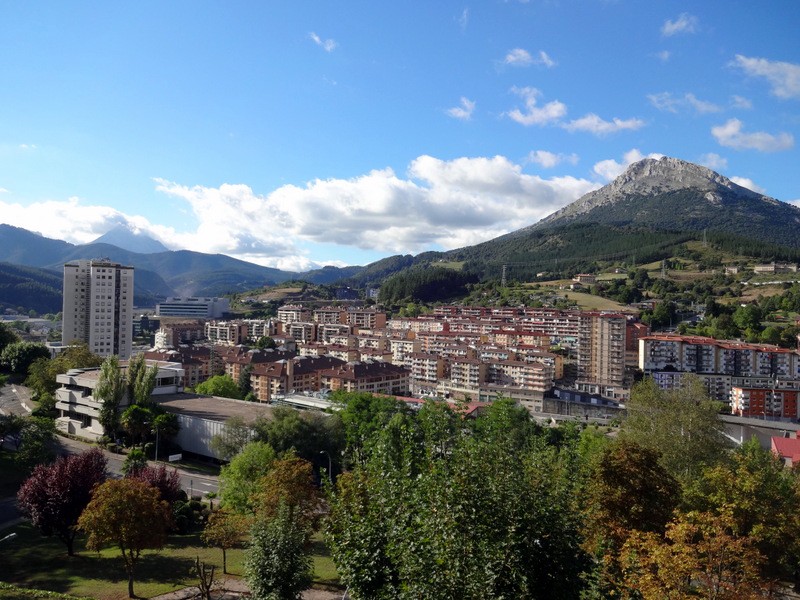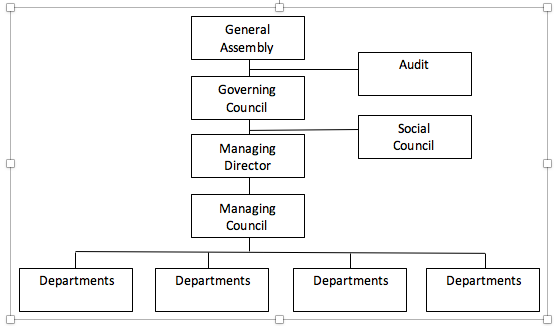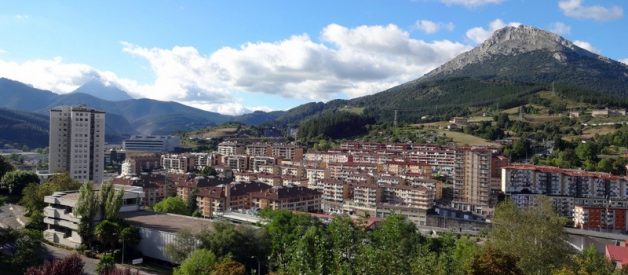Ten Lessons from a visit to the Basque Cooperative Confederation
By Jill Bamburg
 The town of Mondragn-Arrasate. (Richard Hobbs)
The town of Mondragn-Arrasate. (Richard Hobbs)
I recently completed a study tour to Mondragon, a small town in the Basque region of Spain, which is the home of the world?s largest and most advanced cooperative economy.
In the United States, the cooperative sector, which represents over $500 billion in revenues and employs about two million people, is surprisingly invisible. Despite its size, it is seldom, if ever, discussed in business schools or economics programs. Nonetheless, when you mention specific cooperatives or types of cooperatives, most Americans will have had at least some exposure to:
Credit unions, which are member-owned financial cooperatives;
Agricultural cooperatives, such as Sunkist, Ocean Spray, Land o? Lakes, Organic Valley, etc.;
Purchasing cooperatives, such as those in the hardware sector (Ace, Coast to Coast, and True Value);
Consumer cooperatives, such as REI and a host of independent grocery stores;
Housing cooperatives, which have been used to address the needs of seniors, students, mobile home park residents, and (occasionally) low-income communities.
Worldwide, cooperatives are even more significant, representing well over $3 trillion in turnover, 12.6 million in employment, and over a billion people in total membership.
Within the global cooperative movement, the Basque town of Mondragon occupies a special place. Founded in 1956 by Father Jos Mara Arizmendiarrieta, the Mondragon Cooperative Corporation currently consists of 102 federated cooperatives employing over 73,000 people. The vast majority of these worker-owners are in the industrial and distribution segments of the economy, competing successfully in global markets. In addition, the Mondragon cooperative system owns its own bank, university, social welfare agency, several business incubators, and a supermarket chain.
I went to Mondragon to see this system in action and to explore its relevance to the US. Like many Americans who are concerned with rising inequality and environmental degradation, I was seeking an alternative to our current system?s focus on maximizing shareholder value.
The surprise was in the scale of the experiment.
The tour I took was organized and led by Georgia Kelly of the Praxis Peace Institute. Our local guide was Ander Etxeberria, Director of Cooperative Dissemination. Here are ten takeaways from the trip:
- Mondragon is not a ?local, living economy.?
I was not aware of my assumptions about Mondragon until I arrived and found myself surprised. For U.S. citizens sharing an affinity for a leftist critique of capitalism, the very name ?Mondragon? conjures up a humane, economic alternative in which the interests of workers trump the dictates of capital and the well-being of the many trumps the self-interest of the privileged few. These values are well reflected in Mondragon?s operations. The surprise was in the scale of the experiment.
While I had imagined a ?local living economy,? somewhat focused on bartering in line with E.F. Schumacher?s Small is Beautiful philosophy, that is not how Mondragon functions. In Mondragon, ?large is beautiful? because large makes it possible to compete in global markets and thereby maximize employment ? the ultimate goal of the worker-owned system.
2. Mondragon is an advanced industrial economy competing in global markets.
Mondragon today consists of 102 individual cooperatives united in a federation called the Mondragon Cooperative Corporation, which is also organized as a cooperative. Although Mondragon cooperatives now operate in multiple sectors, the most significant cooperatives are worker-owned industrial enterprises competing globally in niche markets.
We visited one of the industrial cooperatives, ULMA Packaging, which makes machines that make packaging for perishable food products. Note: ULMA does not make packaging for these products ? it makes the machines that make the actual packaging.
There are several characteristics that make this an appropriate and potentially sustainable niche for a global competitor coming from a high wage country. First, in global terms, this is a relatively small niche market, less likely to attract a large number of competitors. Second, it is a highly technical niche, relatively insulated from competition from countries with large numbers of low-wage, unskilled workers. Third, each machine is customized to its specific application, thus requiring continued human intervention, providing continued employment. Finally, because these machines play a critical role in their customers? production processes, they tend to compete on quality and reliability rather than price, and the customer necessity of maximizing ?up-time? (that is, the time in which the machines are running properly and production is not halted) creates an important after-market service opportunity.
The plant that we viewed was an assembly plant, which utilized components, materials and logistics provided by both cooperatives and non-cooperatives. As our local guide, Ander Etxeberria, observed, ?In Mondragon, on the one hand, we do not have enough companies to provide to us and, on the other hand, it is not mandatory to buy in our cooperatives.? Instead, their choice hinges on the most competitive bidder.
In an export-led economy, such as Mondragon, much of the ?local living economy? is based on what Michael Porter and others call ?industrial clusters.? In fact, according to Etxeberria, Michael Porter created a strategic plan for the Basque government in the 1990s and helped to shape the industrial clusters operating today.
The thing that was so refreshing about Mondragon was its willingness and ability to deal with facts on the ground, to allow practice to modify theory without losing sight of values.
3. Pragmatism is the only enduring ?ism.?
Over and over, I was struck by the non-doctrinaire adaptability articulated by our guide and demonstrated by the history of the individual cooperatives. We heard (and read) many stories of economic crises and how the cooperatives, individually and collectively, weathered them. In all cases, they remained true to their core value ? providing long-term employment (and other benefits) to their worker-owners ? but they did so with creativity, self-sacrifice, an emphasis on fairness, and an impressive commitment to collaborative decision-making.
The desire for theoretical purity strikes me as a critical failure of both mainstream and alternative economics. When facts fail to conform to theory, there is a strong tendency on both sides to throw out the facts in order to preserve the theory.
The thing that was so refreshing about Mondragon was its willingness and ability to deal with facts on the ground, to allow practice to modify theory without losing sight of values. As I review my experience of Mondragon, I?m thinking this may well be its ?secret sauce,? the key to its long-term success.
4. The social safety net.
In Spain, the state-run social safety net is designed to cover employees. As members of a cooperative, Mondragon?s worker-owners were not originally considered employees under state law. As a result, Mondragon had to set up its own social safety net, which it organized as a cooperative called Lagun Aro. Spain has since revised its position on coverage for worker-owners and Lagun Aro now provides benefits side by side with those offered by the government.
Benefits offered include health care, pensions, and unemployment. Each of these inspired considerable envy among our American tour group.
Spain offers universal health care to its citizens and Mondragon offers its own universal coverage system. We didn?t have an opportunity to discuss the thousand relevant details, large and small, that would give us the basis for a good comparison to the rest of the US system, but we already know our ailing system offers the worst care for the highest price of any system in the developed world. Mondragon may offer a worthy alternative.
The Mondragon pension system is now well aligned and fully integrated with the Spanish government system. Mondragon retirees receive 60 percent of their pension from the government and 40 percent from the Mondragon system. In total, they receive 80 percent of their former salary, enabling them to retire without having to make major shifts in their lifestyle.
The government pension program is an unfunded system (pay-as-you-go), while Lagun Aro is an individual capitalization system. Lagun Aro pension funds are invested conservatively, thereby avoiding some of the self-inflicted insolvency problems created by the US profit-maximizing system. That said, for the public part, the Mondragon system faces the same basic funding issues of defined benefit programs worldwide: uncertainty about where the money will come from in a volatile economy where current workers paying into the system are not keeping pace with the extended lifespans of retirees.
5. Governance
This is an issue that I think Mondragon has figured out really well, striking an important balance between the need for democratic decision-making and managerial discretion.
The cooperatives are structured consistently, roughly as depicted below:

Most of these structures have simple analogs in conventional capitalist firms. The Governing Council is roughly equivalent to the Board of Directors; the Audit function corresponds to the audit committee of the board; the Managing Director to the CEO; the Managing Council to the executive leadership team; and the Departments to standard departments, whether organized functionally, divisionally, geographically, or along some other line.
The critical difference, as noted previously, is that the purpose of the firm is to benefit its members rather than its shareholders. The governance structures supporting that critical difference are the General Assembly and the Social Council.
General Assembly: In most of the Mondragon industrial cooperatives, this is the organization of all worker-owners. In the ?second level? cooperatives, that is, the cooperatives that serve other cooperatives, such as the bank and the health system, member-owners include both employees and representatives of the cooperatives served. The General Assembly meets at least once a year to act on what sounds like a mostly pro forma agenda. That said, its members elect the Governing Council, which in turn selects the Managing Director. Thus, in a very significant way, the workers are directly responsible for the long-term strategic direction of the firm and they select their own boss, who reports to them. And in times of trouble, the General Assembly is a place for the entire cooperative to thrash out difficult issues.
Votes in the General Assembly are strictly apportioned on a one-member, one-vote basis. In a cooperative, the janitor and the CEO have the same voice in the General Assembly ? in contrast to the capitalist shareholder system, where the number of votes is based on the amount of money invested in shares of the enterprise ? typically by absentee shareholders who have no other interest in the firm.
Social Council: This is an entity that is, in some respects, like a labor union, because it represents the concerns of worker-owners, but from the lens of their experience as workers. Since the traditional division of interests between workers and owners cannot, by definition, exist in a worker-owned cooperative, the Social Council was hard for me to understand initially.
It is an elective body that represents worker interests to the Governing Council and Managing Director. It has an advisory role and does not make decisions. However, if an issue is particularly contentious and the Social Council is opposed to the decision of the Governing Council and Managing Director, it can bring the issue to the General Assembly for a vote of the broader membership.
According to what I?ve read, this happens very rarely (as one would hope and expect), but when it has happened, the decisions of the General Assembly have gone both ways ? sometimes supporting ?management? (i.e. the Governing Council and Managing Director) and sometimes supporting the ?workers? (i.e. the Social Council). Disputes are resolved by the ?owners? (i.e. the General Assembly), where all three roles are united in a one-member, one-vote democratic system.
While I don?t have enough data to draw firm conclusions, I believe this structure produces decisions that are both different from and better than those of capitalist firms in two specific ways. First, I think it strikes the right balance between the economic survival of the firm and the economic benefits to the individual workers. And second, because economic decisions may impact individual workers differently, the structure helps produce decisions based on ?fairness? in balancing the needs of the few directly affected individuals with the needs of the many who are not. And all participants in the system are free to make choices with broadly defined benefits ? not the narrow capitalist dictates of maximizing returns to shareholders.
6. A case in point: ?intercooperation? and the bankruptcy of Fagor Electrodomsticos.
In the wake of the 2008 financial crisis, Fagor Electrodomsticos, the largest of the industrial cooperatives, failed, eliminating the jobs of 1,800 worker-owners in 2013.
The cause of the failure was a ?perfect storm? of three related issues. First, immediately prior to the recession, Fagor Electrodomsticos had expanded by buying a competitor in the household white goods sector; it financed the acquisition by taking on major debt. Second, the number of its Asian competitors was growing every day. And third, just as the cooperative?s expanded capacity came on line, the recession hit and the bottom fell out of the market.
What happened next is what was unusual. Because of the principle of ?intercooperation? among the Mondragon cooperative enterprises ? that is, the idea of connectedness and reciprocity among all the participants in the system ? most the employees were relocated to other cooperatives. Some were offered employment in CATA Electrodomsticos, the private sector enterprise that took over the assets of Fagor Electrodomsticos. Some took early retirement, and a handful took a compensation package to leave the system. Some received unemployment benefits from Lagun Aro, the social welfare cooperative. By the time of our 2017 visit, only 60 former employees (three percent) remained unplaced.
Despite its many virtues, Mondragon is not utopia.
7. Contradictions.
Despite its many virtues, Mondragon is not utopia. In the course of our visit, three issues came to light that brought this truth home.
The first, and most troubling, was the issue of international workers who are not members of the cooperatives. As with many successful firms, regardless of structure or industry, much of the growth in recent years has come from international markets, which now account for 70 percent of Mondragon sales. This has necessitated hiring new workers in those new markets. Few, if any, of these new workers have been offered membership in the cooperatives. As a consequence, they do not participate in the benefits of worker-ownership. While they are reportedly treated well they do not participate in the governance of the firm and are not eligible for many of the other unique benefits of the cooperatives.
The most compelling reason we heard for why these international workers are not also owners is that there is not a culture of cooperatives in these foreign markets and Mondragon does not believe in, or have the capabilities for, proselytizing the cooperative form. Admittedly, it might also be against their economic interest to include more worker-owners in the confederation. But whatever the motivation, the net result is to create a set of second-class citizens on whose backs the growth of the firm now depends.
According to our tour leader, Georgia Kelly, ?You cannot impose a cooperative culture where nothing like it exists,? she said. ?It takes a tremendous re-educational effort to bring people into a culture that carries the responsibilities of running a business and sharing in a democratic process. Even with businesses they have acquired in Spain, an educational process must take place before assuming people are ready to be worker-owners. And, of course, not all people want to be worker-owners.?
The second contradiction at Mondragon relates to environmental issues. Even as ?sustainability? issues have found a place in most global firms, I did not see much traction in Mondragon in either practice or articulated values. There is nothing in cooperativism that is inherently greener than any other structure.
On this issue, there is good news on three fronts. First, as environmental responsibility becomes an important consideration for both customers and worker-owners, it is likely to find its way into the mission and function of the cooperatives. Second, as the environmental crisis worsens, it will create many new business opportunities for companies with the technical skills to address them. Mondragon, with its strong technical and industrial skills, will be well positioned to take advantage of these new markets.
Third, the sustainability orientation of Mondragon is potentially further along than I could observe on the ground. According to Michael Peck, North American delegate for Mondragon, ?in the area of sustainability, where Mondragon cooperatives started with EU adhesion to the Kyoto Protocol starting in 1997 (something the U.S. never achieved), they have been very conscious of both sustainability practices as well as essential green industrial certifications (the EU versions of LEED) which they need in order to compete in global markets. The Basque region of Spain is an absolute EU leader in recycling and reuse ? having won awards and this sustainability mentality has also influenced Basque leadership on the GINI coefficient.?
The third issue of concern had to do with the status of women. They were not very much in evidence on either the shop floor as worker-owners or at the management level. Our local guide, the father of two daughters, acknowledged that this situation was less than desirable, but noted that the situation is improving, particularly at the level of the Governing Councils, where they now represent 25 percent of the membership. In Mondragon and elsewhere, there are still far fewer women than men studying engineering, a critical issue in Mondragon?s engineering-heavy industrial economy.
We were also told that to achieve a livable family wage, most families required two incomes. Although there were a handful of cooperatives where women were in the majority (such as the food service operation supporting the cooperatives) and we did see women in administrative positions in offices, I did not see or talk to enough women to get a feeling for their position in the Mondragon system.
Georgia Kelly, our US-based tour organizer, countered that she has seen a definite increase in the number of women in managerial positions and training programs in the nine years she has been coming to Mondragon. She notes that the biggest change is in the younger generation and further notes that men and women doing the same jobs receive the same pay ? an obvious gender equity goal that has yet to be achieved in the US.
Michael Peck also offered specific examples of women in leadership positions, as the General Secretary for Mondragon?s Governing Council, the Mondragon Corporation?s CFO, and the CEO positions in several of the individual cooperatives.
8. Final reflections: Democracy.
As Winston Churchill and others have observed, ?democracy is the worst form of government except for all those other forms.? I?ve certainly had occasion to reflect on that statement since the 2016 election and the advent of the Trump administration. Mondragon gave me further cause for such reflection.
The basic principle of democracy, in cooperatives and in nation-states, is one person, one vote. To work properly, democracy assumes that voters take the necessary time to educate themselves on the issues and participate in the process. In a cooperative, where the democratic process has a direct daily impact on people?s lives and livelihoods, the participation rate and level of thoughtfulness would be expected to be higher than in the more distant matters of representative government.
And sometimes it is. I was impressed in my reading by the complexity of the decisions worker-owners were asked to make, collectively, about salary adjustments, unemployment benefits, overtime pay, required capital inputs, retirement benefits, and a myriad of other issues.
However, while individuals can evaluate complex issues, they don?t always take the time to do so. When asked about specific issues at Mondragon that were troubling to me, our guide would sometimes shrug and say, ?This is a democracy.? To me, that shrug said it all: sometimes people make thoughtful decisions, sometimes not; sometimes they take the time to participate in decision-making, sometimes not. But always there is another day: so long as democracy continues, there is the opportunity for another vote, a different outcome.
Also at work, however, was the notion of the ?tyranny of the majority.? In winner-take-all voting decisions, the will of the majority is imposed on all, including the dissenting minority. In Mondragon, the worker democracy explicitly seeks to balance the general interests of the firm with the particular interests of the individual workers, which are not always internally aligned. Nonetheless, the Mondragon worker-owners are a fairly homogenous group, so one doesn?t have to travel far to experience empathy for ?the other,? and the system is not being asked to address such intractable issues as homelessness, racism or multi-generational poverty, none of which were visible to me in Mondragon. That said, when Father Arizmendiarrieta came to Mondragon, it was the poorest area of Spain. Today, it is the wealthiest, with the majority of its residents as worker-owners of Mondragon. So, ownership has compounding social benefits, stable wages and livelihoods reduce income inequality and improve public health.
? There are three kinds of power. Power than can crush us and we can and must resist it. That?s oppression. Power can assist us and we must guide it. That?s advocacy. But then we can also be power ourselves. This means organizing and building institutions together for what we need.?
9. Final reflections: Social change.
At one point our guide reminded us that Father Arizmendiarrieta was not interested in creating a cooperative economy. His goal was social transformation and the economic structure of the cooperative enterprises was simply a means to that end.
This observation prompted some musings about different approaches to social change ? specifically, the differences between the goals of social responsibility, social justice and social transformation.
Corporations tend to talk about social responsibility, by which they mean taking responsibility for both the positive and negative impacts of the activities they pursue in the normal course of doing business. Their method is sometimes incremental improvement toward the goal of reducing harm, while preserving the essential characteristics of the existing system.
Social justice movements tend to talk about social justice, by which they mean some sort of redress of past wrongs ? whether that takes the form of backward-looking reparations or forward-looking policy adjustments. I find I have a deeper understanding of the limitations of the social justice approach as a viable platform for social change, as opposed to building the institutions that undergird economic transformation, like cooperative structures. The Mondragon cooperatives talk about social transformation, a more far-reaching, future-oriented goal that seeks the creation of social and economic systems that reinforce the best in human nature. At the heart of this transformation is the desire to emphasize cooperation as opposed to competition as the most likely path toward creating a future that maximizes the well-being of all. In the United States, a social justice culture focused more on creating our own alternatives, as opposed to fighting old paradigms needs further nurturance. And in the culture overall, we need to take responsibility for our contributions to our financial destinies, to the extent we can under existing contraints.
As Ed Whitfield, Co-Managing Director of the Fund for Democratic Communities recently put it, ? There are three kinds of power. Power than can crush us and we can and must resist it. That?s oppression. Power can assist us and we must guide it. That?s advocacy. But then we can also be power ourselves. This means organizing and building institutions together for what we need.?
10. Final reflections: Could the Mondragon system work in the US?
This is the question that brought me, and most of my traveling companions, to Mondragon in the first place.
The answer is, at best, a ?maybe.? I would have thought that the biggest obstacles to cooperativism in the U.S. would be American individualism, access to capital, and access to talent. In the end, I have come to believe the biggest impediments would be our culture and the weakness of our K-12 math and science education.
The issues of individualism and the availability of talent are related. The assumption of the dominant culture ? reinforced by our current economic system ? is that each of us is on our own, out for ourselves (and our immediate families), and that the pursuit of material rewards (including extraordinary rewards) is the primary motivation for our economic behavior. These are old, ingrained habits of thinking that will continue to persist among large segments of the US population, reinforced by neoliberal orthodoxy and business-driven consumerism. But there is growing evidence and support for alternatives that seek to satisfy deeper human needs, such as compassion for one?s fellows and the pursuit of meaning in one?s work.
As for the availability of capital, all cooperatives ? and the Mondragon cooperatives in particular ? require that their member-owners invest seed capital in the enterprise, giving them a definite sense of ?having skin in the game.? While these contributions are unlikely to be sufficient to meet the capital requirements of the enterprise, they are an important start. The chief obstacle to attracting additional sources of capital is a lack of understanding of the cooperative model and investors? reluctance to supply capital without clear collateral or recourse. There are ways to overcome this issue, beginning with loan guarantees from those who understand and support the model.
The two other obstacles ? culture and K-12 education ? seem far more intractable at this point. Unless that shifts, the cooperative model will not work. And the capitalist model ? at least for the 99% ? may fare no better.
As for K-12 education, the current U.S. educational establishment?s emphasis on improving STEM (science, technology, engineering and math) education is not misplaced. A majority of the Mondragon cooperatives are in the industrial manufacturing sector, an increasingly sophisticated part of the economy, where the need for math and science skills is clear ? and the US ability to compete successfully is marginal. But it?s not just manufacturing. One can imagine a sophisticated, cooperatively organized, service-based economy that would also require significant technical expertise. STEM education is the right approach, but we are far from figuring out how to deliver it effectively.
There are a host of intractable social problems in the US ? homelessness, racism, addiction, obesity, violence, to name just a few ? that may have economic elements, but cannot be solved even by a cooperative economic utopia.
But all of these issues cited here exist in the United States and elsewhere, regardless of whether our economies are organized under capitalist or cooperative principles. The fundamental issues that are well addressed by cooperativism ? a reduction in economic inequality and a better alignment of the interests of workers, owners and managers ? are critical. I am deeply grateful for the lessons learned in the 60 years of the Mondragon experiment and hope we can apply some of them here in the U.S. as we work to create a more equitable, sustainable economy.
Jill Bamburg is a Co-Founder of the Bainbridge Graduate Institute and on the Faculty of Presidio Graduate School in San Francisco.


